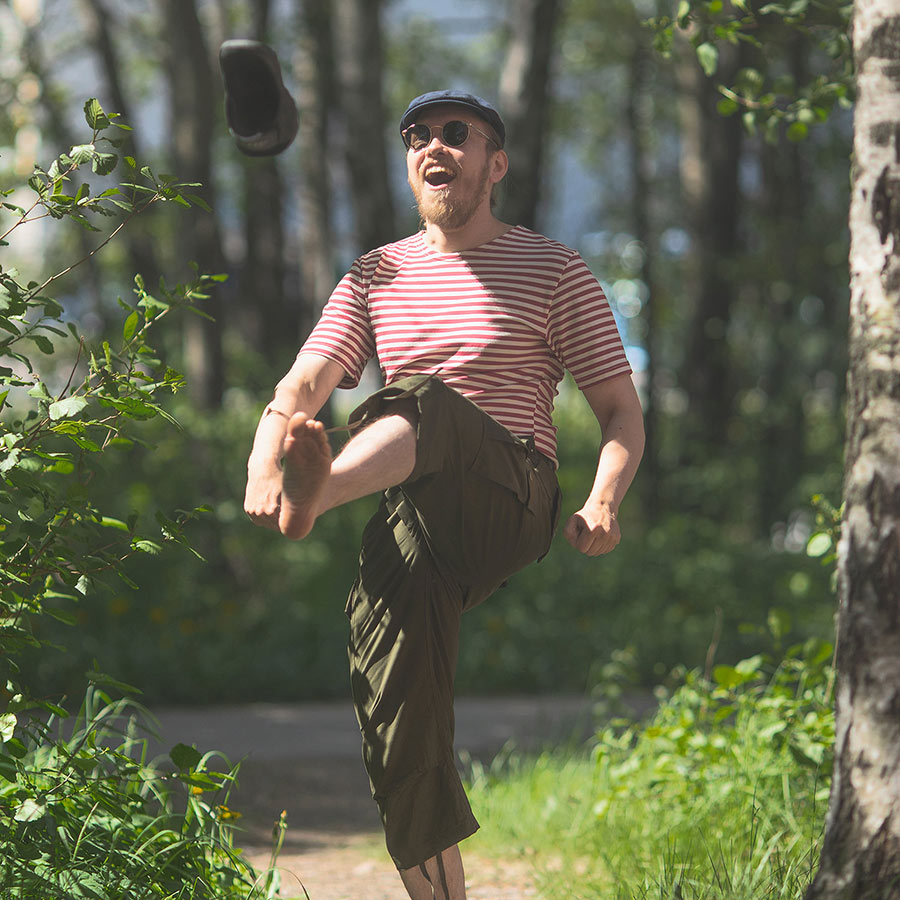
Operation Unethicality Program 2019 - 2021: Recon
Operation Unethicality Program 2019 - 2021: Recon
Varusteleka is on the good side and attempts to reduce destruction to the environment. We head towards the following main goals:
- We study our environmental footprint and aim to eliminate it
- We're open about the environmental impact of our products
- We share information about our actions and set an example for others.
Huh?
Our vision includes plans to dominate the world. We also hope to have a world in the future, otherwise conquering it would be useless. As the good siders, we have to somehow address what's going on here on Earth. Change starts with ourselves, so we took a big mirror and looked at our (sometimes hairy) navels.
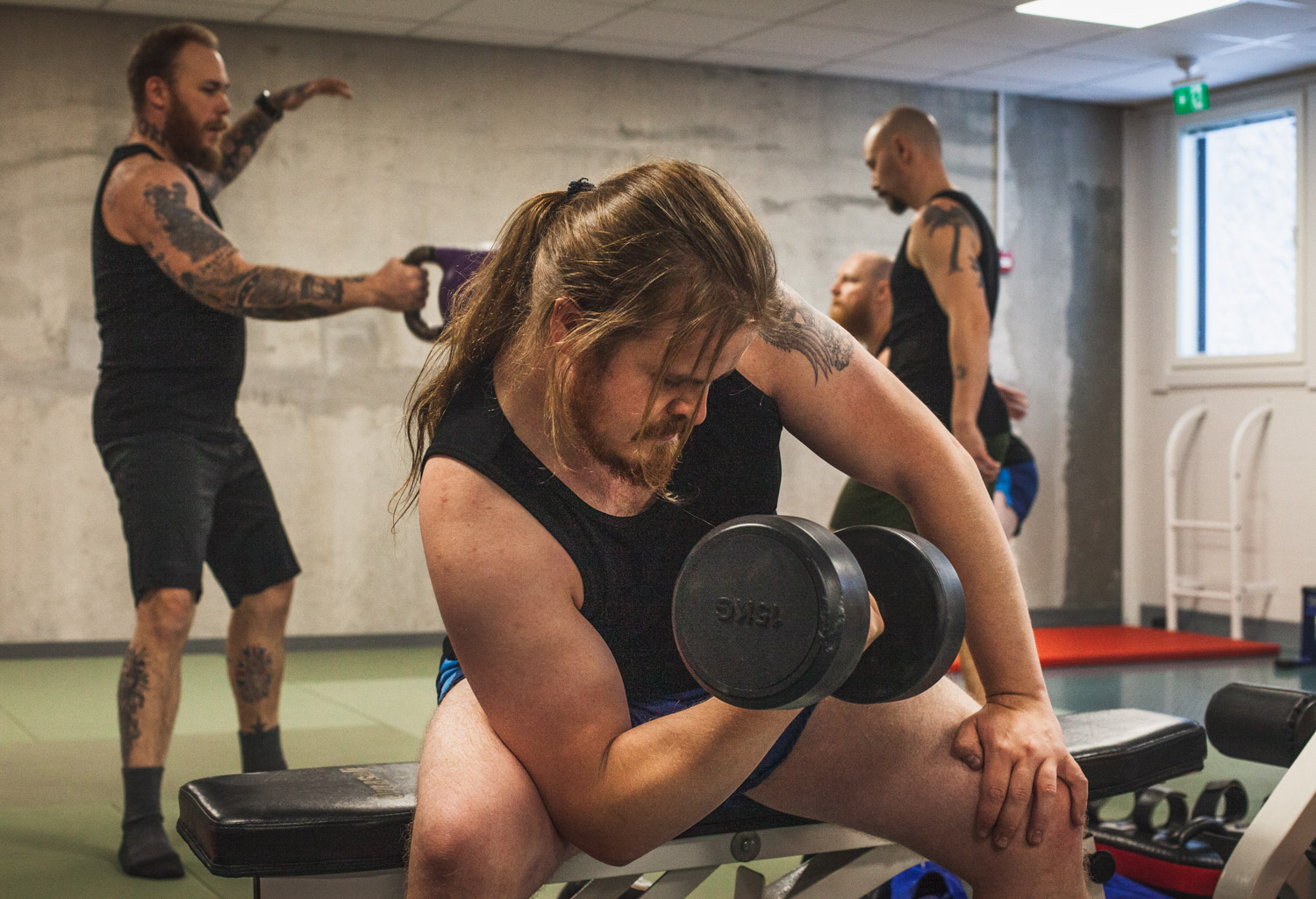 Hairy navels taking care of themselves and thinking of saving the world. Maybe.
Hairy navels taking care of themselves and thinking of saving the world. Maybe.
First, we thought about means to research our environmental footprint and how to eliminate it. As it's no use to reinvent the wheel, we asked for help from outside our company to understand and track these things better. International certificates are good, but were a bit too complex for our liking, so we set to achieve a Nordic EcoCompass certificate, which is rather clear and down to earth. This kind of projects cost money, of course, but in the long run these decisions and practices will also save money thanks to reduced waste (packing materials for example) and unnecessary purchases.
Are we the good guys?
Many environmental decisions also cut our costs, so committing to these should go without saying. To go above and beyond the call of duty we must know, how much damage our day-to-day business causes to the world. We inspected Varusteleka from many angles on the inside and outside, and also through our associates and suppliers. The full report is 20 pages long, but here are a few key points:
We have recently moved our operations into an energy-efficient building. We monitor our use of electricity and water and take action if deemed necessary.
Obviously, we produce waste. We sort everything we can in-house, most of it is packing materials. For example, we throw out 52 metric tons of cardboard and cartons every year, which means about 10 truckloads. All of these are picked up for recycling. In the year 2018, we sent out 143 000 parcels and printed about 40 kilometres (25 miles) of address labels for those. We have ditched plastic bags in our brick & mortar shop and offer recyclable tote bags with a deposit instead. We produce about 1400 litres of textile waste, which is picked up and turned into trash electricity. Our operations do not produce hazardous waste.

Transport, travel and logistics as a whole represents our biggest sin against mother nature. Most trailer trucks deliver goods to us from Europe. We received sea freight 21 times last year from China and the United States, and three times via train from China. Nine times we had to have things shipped to us via air freight.
We have only started to calculate our emissions and will need our partners to get a better picture, because shipping to us is outsourced. We haven't had our own lorry for years, not to mention aeroplanes. The process will take its time, but we aim to publish these in an understandable form, compensate for emissions, choose less harmful means of delivery and favour logistics partners who also hold these values in high regard.
Other things to consider are our business trips, naturally those count as well. It's delightful and mandatory to meet our partners and suppliers around the world, but these expand our footprint to be compensated. Last year our in-house gang flew about 25 000 kilometres (15,500 miles) to events and exhibitions and the Road Show pop-up-container toured in 13 cities for 6250 kilometres (3884 miles).
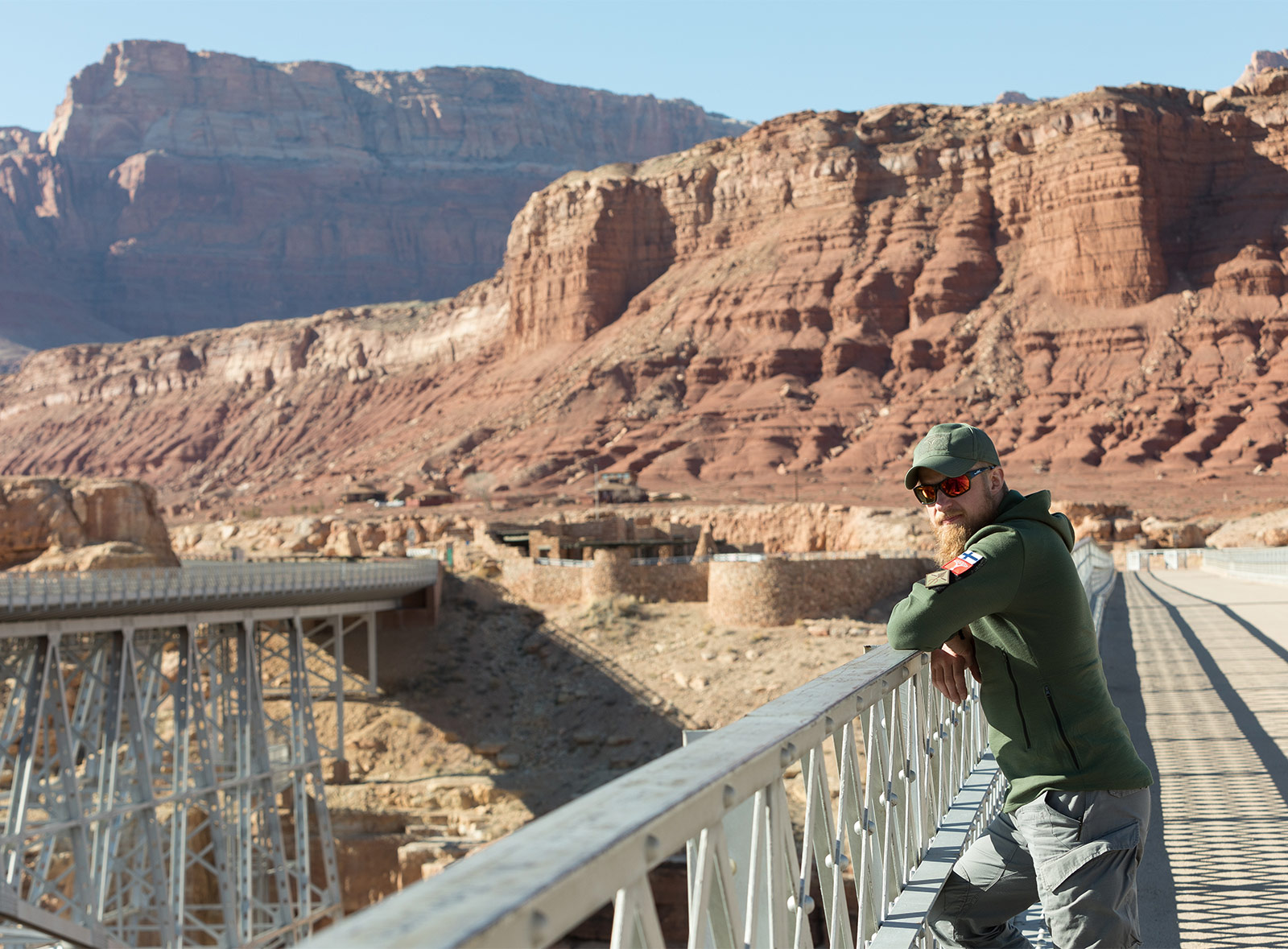 When you prepare to dominate the world, you have to see it first. Sometimes this takes you far away from home.
When you prepare to dominate the world, you have to see it first. Sometimes this takes you far away from home.
A second significant source of emissions is our purchases. We buy and resell products that can be divided into three categories as follows:
- Surplus (about 14 % of our sales)
- In-house brands (about 44 % of our sales)
- Other brands (about 42 % of our sales).
Sourcing and selling surplus is a good thing: they were already produced for other reasons, so their production is not on us. Grabbing these means less waste in garbage piles.
When we have our own clothes and equipment made, we can affect how much the environment is damaged. We have always wanted to design necessary and functional products, which have a long lifespan and are easy to maintain. Särmä, Särmä TST, Terävä and Jämä products don't need to be washed constantly and they are designed to be hard-wearing. That's why we have a 12-month warranty for clothes. Choices of material, places of manufacture and quality criteria are our tools for being more responsible. We also have a Circular Economy program to buy used items back and sell them again as sort-of surplus, which extends the life cycle of the product.
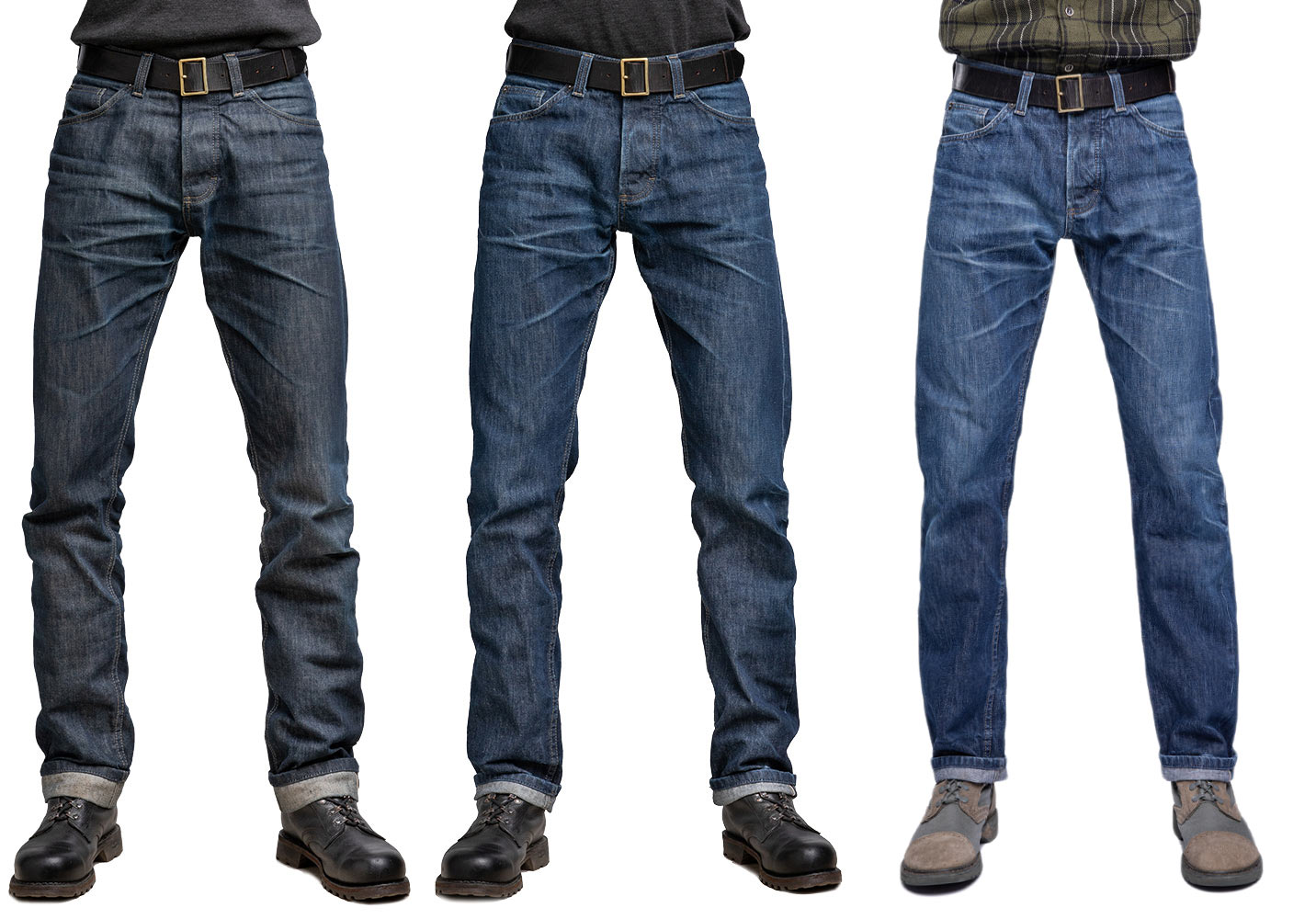 A good product lasts from one user to another and serves its purpose even when worn.
A good product lasts from one user to another and serves its purpose even when worn.
Other brands we carry are responsible for their actions. They weren't necessarily picked thinking of the ethical angle, but because they are what we consider high-quality and durable products. In any case, we challenge our suppliers to think twice about their choices. Quite many of them address environmental issues on their websites. If someone doesn't, demand it from them just like us!
Communication and influencing as well as committing our partners are things we do influence others. We're pretty good at this. When we find out something - good or bad - we let everyone know, as we have done so far. We help people maintain our products correctly, choose the right sizes for them and return things they no longer use to us through Circular Economy. Should we buy something dumb or find out quality issues, we're open about that too. Our staff is encouraged to sort their garbage, take generally good care of themselves and commute to work by bus or bike when possible. Everyone has an Extreme Ownership of doing the right thing and help others succeed.
How we eliminate our environmental footprint, phase 1
After studying the above things, we scored them based on their significance and our ability to affect them. This gave us a weighted priority list of things to do first and our strategy for 2019-2021 includes the following focal points:
- Responsible purchases and material efficiency
- Logistics and transportation
- Communication and influencing.
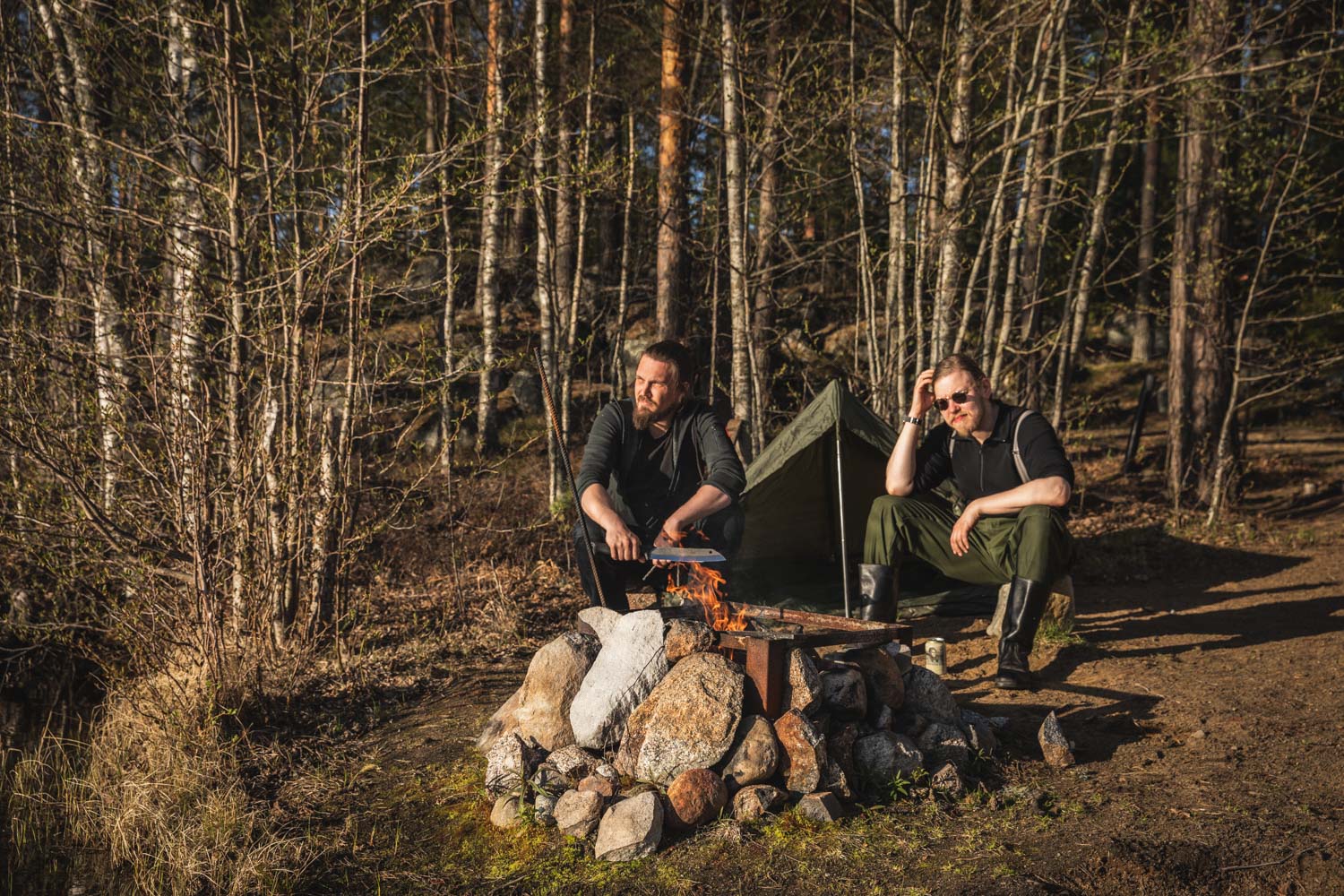
What are the actions that follow? We have undersigned an environmental program for 2019-2021, which includes 12 goals:
- Responsible purchases
- Know the contractors of our house brands and their environmental goals better
- Make contracting more transparent to consumers by sharing information about the contractors and materials
- Make products with a known environmental footprint - which is as small as possible - which are suitable for Circular Economy.
- Material efficiency
- Reduce packing materials both incoming and outgoing
- Choose recycled and/or recyclable packing materials
- Develop packing solutions of our own
- Recognize Jämä and Tunkio (our local B-stock outlet) as part of material efficiency.
- Logistics
- Study the environmental impact of our logistics together with our partners and find more ecological options
- Make it easier for customers to visit Varusteleka
- Encourage employees to consider ecological commuting, look into possibilities for remote work and support these choices.
- Communication and influencing.
- Share knowledge of our environmental effects as well as actions and goals we are committed to
- Educate our staff to do better on all fronts.
In addition to these, we'll introduce some kind of a natural resources / emissions counter, which helps us understand our footprint and communicate it to others. Our goal is to inform you product-by-product, how (un)ethical each choice is, and also offer a possibility to choose better for example by choosing a suitable shipping method.
We are working on many of these goals already and some of them are realized during this year already. We'll let you know whenever we get something done, and at the same time our Gang (you) can challenge us by asking questions and posting comments about environmental and ethical issues.
The journey has begun
We were audited by EcoCompass in early June, were approved and got an EcoCompass Certificate. It means that an outside entity has recognized our goals and actions and deems them a good start towards something better. To maintain this certificate, we update our goals annually and make larger environmental decisions every three years. So it's not just a one-off attempt at greenwashing, but a permanent means of doing business.
If everyone at Varusteleka does one good deed each day, it means 20,000 good deeds each year. If our 50,000 Facebook followers join the effort, it means over 18 million good deeds. And it's just one daily action per person, hardly too much to handle. Who says we can't affect things together?
Phase 2 is coming in the fall of 2019 spring of 2020. We'll let you know how things have proceeded and publish, among other things, a material dump.